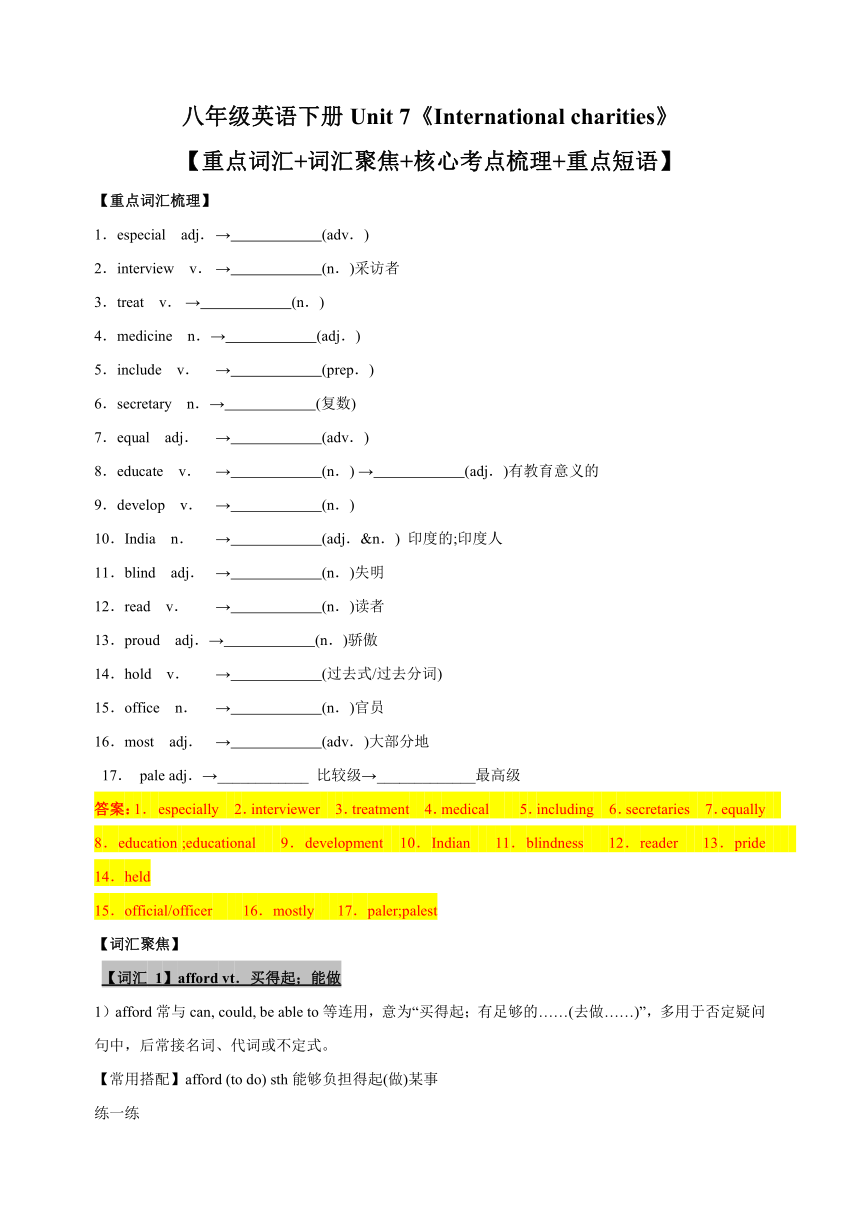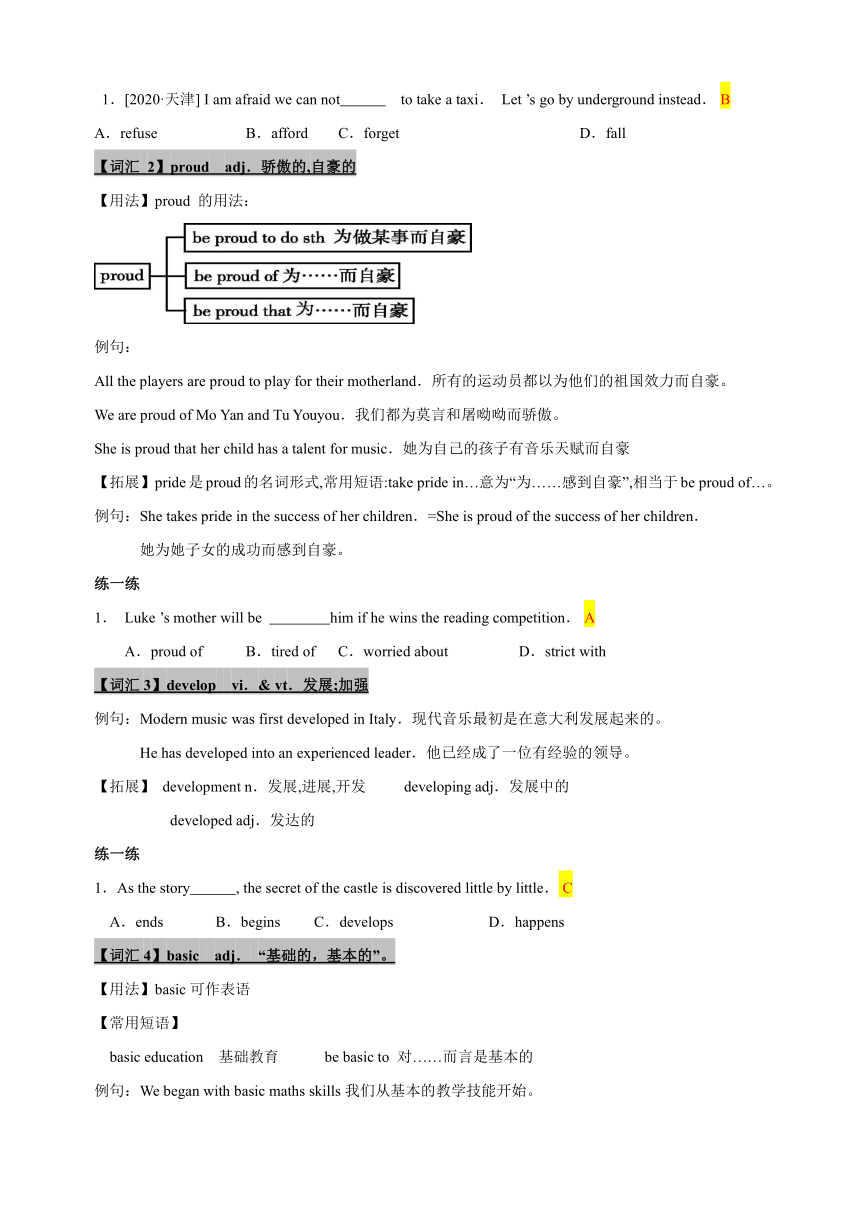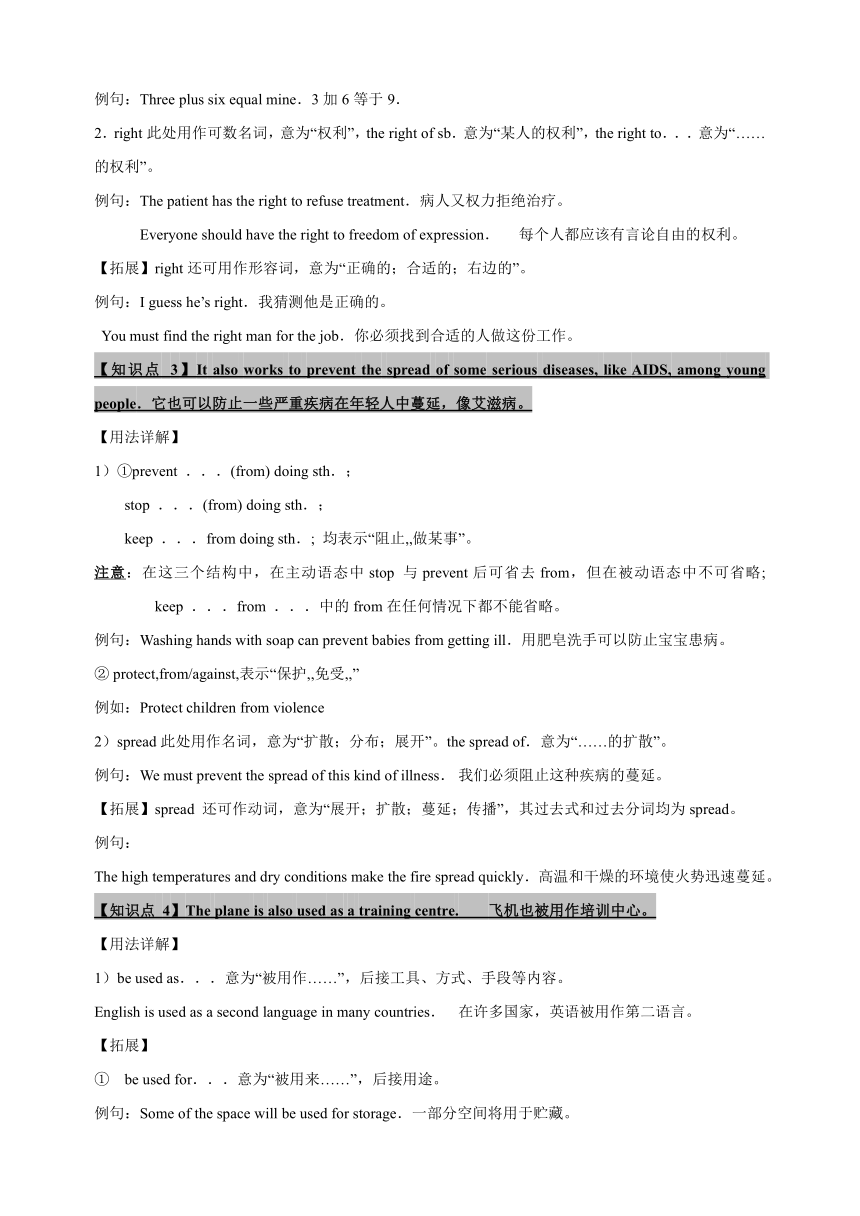译林版八年级英语下册Unit 7 International charities 重点词汇+词汇聚焦+核心考点梳理+重点短语
文档属性
| 名称 | 译林版八年级英语下册Unit 7 International charities 重点词汇+词汇聚焦+核心考点梳理+重点短语 |

|
|
| 格式 | docx | ||
| 文件大小 | 70.7KB | ||
| 资源类型 | 教案 | ||
| 版本资源 | 牛津译林版 | ||
| 科目 | 英语 | ||
| 更新时间 | 2024-03-29 00:00:00 | ||
图片预览




文档简介
八年级英语下册Unit 7《International charities》
【重点词汇+词汇聚焦+核心考点梳理+重点短语】
【重点词汇梳理】
1.especial adj. → (adv.)
2.interview v. → (n.)采访者
3.treat v. → (n.)
4.medicine n.→ (adj.)
5.include v. → (prep.)
6.secretary n.→ (复数)
7.equal adj. → (adv.)
8.educate v. → (n.) → (adj.)有教育意义的
9.develop v. → (n.)
10.India n. → (adj.&n.) 印度的;印度人
11.blind adj. → (n.)失明
12.read v. → (n.)读者
13.proud adj.→ (n.)骄傲
14.hold v. → (过去式/过去分词)
15.office n. → (n.)官员
16.most adj. → (adv.)大部分地
17. pale adj.→____________ 比较级→_____________最高级
答案:1. especially 2.interviewer 3.treatment 4.medical 5.including 6.secretaries 7.equally 8.education ;educational 9.development 10.Indian 11.blindness 12.reader 13.pride 14.held
15.official/officer 16.mostly 17.paler;palest
【词汇聚焦】
【词汇 1】afford vt.买得起;能做
1)afford常与can, could, be able to等连用,意为“买得起;有足够的……(去做……)”,多用于否定疑问句中,后常接名词、代词或不定式。
【常用搭配】afford (to do) sth能够负担得起(做)某事
练一练
1.[2020·天津] I am afraid we can not to take a taxi. Let ’s go by underground instead. B
A.refuse B.afford C.forget D.fall
【词汇 2】proud adj.骄傲的,自豪的
【用法】proud 的用法:
例句:
All the players are proud to play for their motherland.所有的运动员都以为他们的祖国效力而自豪。
We are proud of Mo Yan and Tu Youyou.我们都为莫言和屠呦呦而骄傲。
She is proud that her child has a talent for music.她为自己的孩子有音乐天赋而自豪
【拓展】 pride是proud的名词形式,常用短语:take pride in…意为“为……感到自豪”,相当于be proud of…。
例句:She takes pride in the success of her children.=She is proud of the success of her children.
她为她子女的成功而感到自豪。
练一练
1. Luke ’s mother will be him if he wins the reading competition. A
A.proud of B.tired of C.worried about D.strict with
【词汇3】develop vi.& vt.发展;加强
例句:Modern music was first developed in Italy.现代音乐最初是在意大利发展起来的。
He has developed into an experienced leader.他已经成了一位有经验的领导。
【拓展】 development n.发展,进展,开发 developing adj.发展中的
developed adj.发达的
练一练
1.As the story , the secret of the castle is discovered little by little. C
A.ends B.begins C.develops D.happens
【词汇4】basic adj. “基础的,基本的”。
【用法】basic可作表语
【常用短语】
basic education 基础教育 be basic to 对……而言是基本的
例句:We began with basic maths skills我们从基本的教学技能开始。
【拓展】basically 副词,意为“大体上,基本上;总的来说”。
例句:That’s basically correct.那基本正确。
【词汇5】hand out 分发;提出
【用法】hand out为“动词+副词”结构的短语,当其宾语是名词时,放在out前后皆可;当宾语为代词时,只能放在hand 和out 中间。其同义词组为give out。hand out sth to sb 意为“把某物分发给某人”。
例句:The teacher handed the exercise books out to the students.老师将作业本分发给了学生。
Here are the books. Please hand them out.书在这儿,请把它们分发出去。
【词汇6】not…at all 根本不,完全不
【用法】 not…at all意为“根本不,完全不”,at all 放在句尾用于加强否定语气。
例句:He didn’t understand what I said at all.他根本不理解我说的话。
He can’t play the piano at all.他根本不会弹钢琴。
【拓展】 not at all 也可单独使用,为交际用语,意为“不客气;不用谢”,是回答道谢的客套话。
【核心考点聚焦】
【知识点1】You have some pocket money left.你还剩下一些零花钱。
【用法详解】left此处是leave的过去分词,意为“剩余的”。
例句:At the end of the party, we had some food left. 聚会结束的时候,我们还剩下些食物。
【拓展】
1)left还可用作名词,意为“左边”。
The girl on the left is Lily. 左边的那个女孩是莉莉。
2)left用作副词,意为“向左”。
You can turn left at the second crossing. 你可以在第二个十字路口向左拐。
3)left用作形容词,意为“左边的”。
The post office is on the left side of the street. 邮局在街道的左侧。
【知识点 2】It works for the equal rights of girls and women too. 它还为女孩和妇女的平等的权利/而工作
【用法详解】
1.1)equal adj.平等的
例句:We are equal in every way.我们在各个方面都是平等的。
2)作形容词,还可以为“相同的,相等的”。常用短语:be equal to 意为“等于,等同”。
例句:Tom is equal to Jim in height.汤姆和吉姆一样高。
3)还可作动词,意为“与……相等;等于”。
例句:Three plus six equal mine.3加6等于9.
2.right此处用作可数名词,意为“权利”,the right of sb.意为“某人的权利”,the right to...意为“……的权利”。
例句:The patient has the right to refuse treatment.病人又权力拒绝治疗。
Everyone should have the right to freedom of expression. 每个人都应该有言论自由的权利。
【拓展】right还可用作形容词,意为“正确的;合适的;右边的”。
例句:I guess he’s right.我猜测他是正确的。
You must find the right man for the job.你必须找到合适的人做这份工作。
【知识点 3】It also works to prevent the spread of some serious diseases, like AIDS, among young people.它也可以防止一些严重疾病在年轻人中蔓延,像艾滋病。
【用法详解】
1)①prevent ...(from) doing sth.;
stop ...(from) doing sth.;
keep ...from doing sth.; 均表示“阻止,,做某事”。
注意:在这三个结构中,在主动语态中stop 与prevent后可省去from,但在被动语态中不可省略; keep ...from ...中的from在任何情况下都不能省略。
例句:Washing hands with soap can prevent babies from getting ill.用肥皂洗手可以防止宝宝患病。
② protect,from/against,表示“保护,,免受,,”
例如:Protect children from violence
2)spread此处用作名词,意为“扩散;分布;展开”。the spread of.意为“……的扩散”。
例句:We must prevent the spread of this kind of illness. 我们必须阻止这种疾病的蔓延。
【拓展】spread 还可作动词,意为“展开;扩散;蔓延;传播”,其过去式和过去分词均为spread。
例句:
The high temperatures and dry conditions make the fire spread quickly.高温和干燥的环境使火势迅速蔓延。
【知识点 4】The plane is also used as a training centre. 飞机也被用作培训中心。
【用法详解】
1)be used as...意为“被用作……”,后接工具、方式、手段等内容。
English is used as a second language in many countries. 在许多国家,英语被用作第二语言。
【拓展】
① be used for...意为“被用来……”,后接用途。
例句:Some of the space will be used for storage.一部分空间将用于贮藏。
② be used by...意为“被……使用”,后接使用者。
例句:A security policy can be used by one or more projects.一项安全策略能够被一个或者多个项目使用。
③ be used in...意为“被用于……方面”。
例句:I hope that the money is used in medical research. 我希望这些钱被用于医学研究方面。
【知识点5】During my last visit, 150patiens were operated on. 在上一次的旅行中,我给150个病人做了手术。
【用法详解】
1)patient此处用作可数名词,意为“病人,患者”。
例句:These patients are waiting for the doctor to come. 这些病人正在等医生来。
【拓展】patient还可用作形容词,意为“能忍耐的,有耐心的”。be patient with sb.“对某人有耐心”。
例句:The teacher is patient enough to explain every point to us.老师有足够耐心,向我们解释了每一个要点。
As a doctor, you should be patient with all the patients.作为一名医生,你应该对所有的病人有耐心。
3)operate不及物动词,意为“开刀;做手术”,“给某人做手术”应用operate on sb.表示。
4)operate 的名词形式为operation(手术),同义短语为:do/perform an operation on ...。
例句:The doctor operated on him last night. 医生做晚给他做手术。
【拓展】operate用作动词时还意为“操作;开动(机器等)”。
例句:He can operated the machine by himself.他能独立操作这台机器。
【知识点6】Modern medicine is developing quickly and now most eye problems and diseases can be treated and cured. 现代医学正在迅速发展,而且现在大多数眼疾能得到治疗并治愈。
【用法详解】 1)medicine不可数名词,意为“医学;药”。“服药;吃药;喝药“应用take the medicine表示,而不用eat the medicine或drink the medicine表示。
例句:I felt much better after taking the medicine.我吃了药后好受多了。
He turned to the study and practice of medicine.他转向医学研究和实践。
【拓展】medical adj. “医学的,医疗的”
常用短语:medical treatment医疗 medical research 医学研究
2)develop可用作及物动词或不及物动词,意为“发展;加强”。develop into“发展成”。
例句:Their friendship has developed over a number of years.多年来他们的友谊日益深厚。
【拓展】development用作可数名词或不可数名词,意为“发展;进展;发达;发育”;developing意为“发展中的”,developed意为“发达的”。
3)treat及物动词,意为“治疗”。treat sb./sth.with sth.意为“用某物治疗某人/某物”,treat sb.for sth.意为“因某事治疗某人”。
例句:No one knew how to treat this deadly disease.没人知道如何治疗这种致命的疾病。
The doctor is treating him for his illness. 医生正在给他治疗。
【拓展】①treat用作及物动词,还可意为“对待;看待;把……看作”,treat as...意为“把……看作……”。
②还可作名词,意为“款待,招待,”my treat意为“我请客”。
【辨析】treat与cure
treat 宾语是人、某种疾病或发病的部位,强调治疗的过程,指对病人进行诊断和治疗,但不含治好的意思。
cure 宾语可以是人,也可以是某种疾病,强调治疗的结果,指治愈某种疾病或某人的疾病。
例句:
I will try my best to treat him, but I ‘m not sure whether I can cure him.我会尽最大努力给他治疗,但是我不确定能否治好他。
【知识点 7】But more money is needed to carry on with our work.但是(我们)需要更多的钱来继续开展我们的工作。
【用法详解】1)carry on with sth 意为“继续开展某事”,相当于carry on doing sth, go on doing sth和continue to do/doing sth。
The doctor told her to carry on with the treatment.
医生告诉她要继续这种疗法。
【知识点 8】…so she made up her mind to train as a nurse and attended courses after work.……因此她下定决心接受护士工作的训练,并在下班后去上课。
【用法】1)make up one ’s mind to do sth意为“下定决心做某事”,相当于decide to do sth/make a decision to do sth。
例句:I’ve made up my mind to forget all the past and start a new life.
我已经下定决心要忘掉过去的一切,开始新的生活。
Have you decided to give up smoking 你下定决心戒烟了吗
It ’s time for you to make a decision.到你做出决定的时候了。
【重点短语梳理】
1.一个叫作……的慈善机构
2.去看病
3.医疗
4. 给某人做手术
5.负担不起做某事
6.为做某事而自豪
7.以……为骄傲
8.继续开展某事
9.继续做某事
10.数以百万的
11.设立
12.被用作……
13. 被用来做某事
14.没什么严重的
15.吃药
16.学生会
17.分发;提出
18.训练当一名护士
19.害怕
20.开车去上班
21. 下定决心做某事
22.牙疼
23.被邀请做某事
24.在飞机(船、火车)上
25.现代医学
26.接受基础教育
27.不再……
28.拿出;取出
a charity called…
go to hospital
medical treatment
operate on sb/
do an operation on sb
can’t afford to do sth
be proud to do sth
be proud of…/
take pride in…
carry on with sth
carry on doing sth
millions of
set up
be used as…
be used to do sth/
be used for doing sth
nothing serious
take the medicine
the Students’ Union
hand out
train as a nurse
be afraid of
drive to work
make up one’s mind to do sth
have/get (a) toothache
be invited to do sth
on board
modern medicine
receive basic education
not…any more
take out
【重点词汇+词汇聚焦+核心考点梳理+重点短语】
【重点词汇梳理】
1.especial adj. → (adv.)
2.interview v. → (n.)采访者
3.treat v. → (n.)
4.medicine n.→ (adj.)
5.include v. → (prep.)
6.secretary n.→ (复数)
7.equal adj. → (adv.)
8.educate v. → (n.) → (adj.)有教育意义的
9.develop v. → (n.)
10.India n. → (adj.&n.) 印度的;印度人
11.blind adj. → (n.)失明
12.read v. → (n.)读者
13.proud adj.→ (n.)骄傲
14.hold v. → (过去式/过去分词)
15.office n. → (n.)官员
16.most adj. → (adv.)大部分地
17. pale adj.→____________ 比较级→_____________最高级
答案:1. especially 2.interviewer 3.treatment 4.medical 5.including 6.secretaries 7.equally 8.education ;educational 9.development 10.Indian 11.blindness 12.reader 13.pride 14.held
15.official/officer 16.mostly 17.paler;palest
【词汇聚焦】
【词汇 1】afford vt.买得起;能做
1)afford常与can, could, be able to等连用,意为“买得起;有足够的……(去做……)”,多用于否定疑问句中,后常接名词、代词或不定式。
【常用搭配】afford (to do) sth能够负担得起(做)某事
练一练
1.[2020·天津] I am afraid we can not to take a taxi. Let ’s go by underground instead. B
A.refuse B.afford C.forget D.fall
【词汇 2】proud adj.骄傲的,自豪的
【用法】proud 的用法:
例句:
All the players are proud to play for their motherland.所有的运动员都以为他们的祖国效力而自豪。
We are proud of Mo Yan and Tu Youyou.我们都为莫言和屠呦呦而骄傲。
She is proud that her child has a talent for music.她为自己的孩子有音乐天赋而自豪
【拓展】 pride是proud的名词形式,常用短语:take pride in…意为“为……感到自豪”,相当于be proud of…。
例句:She takes pride in the success of her children.=She is proud of the success of her children.
她为她子女的成功而感到自豪。
练一练
1. Luke ’s mother will be him if he wins the reading competition. A
A.proud of B.tired of C.worried about D.strict with
【词汇3】develop vi.& vt.发展;加强
例句:Modern music was first developed in Italy.现代音乐最初是在意大利发展起来的。
He has developed into an experienced leader.他已经成了一位有经验的领导。
【拓展】 development n.发展,进展,开发 developing adj.发展中的
developed adj.发达的
练一练
1.As the story , the secret of the castle is discovered little by little. C
A.ends B.begins C.develops D.happens
【词汇4】basic adj. “基础的,基本的”。
【用法】basic可作表语
【常用短语】
basic education 基础教育 be basic to 对……而言是基本的
例句:We began with basic maths skills我们从基本的教学技能开始。
【拓展】basically 副词,意为“大体上,基本上;总的来说”。
例句:That’s basically correct.那基本正确。
【词汇5】hand out 分发;提出
【用法】hand out为“动词+副词”结构的短语,当其宾语是名词时,放在out前后皆可;当宾语为代词时,只能放在hand 和out 中间。其同义词组为give out。hand out sth to sb 意为“把某物分发给某人”。
例句:The teacher handed the exercise books out to the students.老师将作业本分发给了学生。
Here are the books. Please hand them out.书在这儿,请把它们分发出去。
【词汇6】not…at all 根本不,完全不
【用法】 not…at all意为“根本不,完全不”,at all 放在句尾用于加强否定语气。
例句:He didn’t understand what I said at all.他根本不理解我说的话。
He can’t play the piano at all.他根本不会弹钢琴。
【拓展】 not at all 也可单独使用,为交际用语,意为“不客气;不用谢”,是回答道谢的客套话。
【核心考点聚焦】
【知识点1】You have some pocket money left.你还剩下一些零花钱。
【用法详解】left此处是leave的过去分词,意为“剩余的”。
例句:At the end of the party, we had some food left. 聚会结束的时候,我们还剩下些食物。
【拓展】
1)left还可用作名词,意为“左边”。
The girl on the left is Lily. 左边的那个女孩是莉莉。
2)left用作副词,意为“向左”。
You can turn left at the second crossing. 你可以在第二个十字路口向左拐。
3)left用作形容词,意为“左边的”。
The post office is on the left side of the street. 邮局在街道的左侧。
【知识点 2】It works for the equal rights of girls and women too. 它还为女孩和妇女的平等的权利/而工作
【用法详解】
1.1)equal adj.平等的
例句:We are equal in every way.我们在各个方面都是平等的。
2)作形容词,还可以为“相同的,相等的”。常用短语:be equal to 意为“等于,等同”。
例句:Tom is equal to Jim in height.汤姆和吉姆一样高。
3)还可作动词,意为“与……相等;等于”。
例句:Three plus six equal mine.3加6等于9.
2.right此处用作可数名词,意为“权利”,the right of sb.意为“某人的权利”,the right to...意为“……的权利”。
例句:The patient has the right to refuse treatment.病人又权力拒绝治疗。
Everyone should have the right to freedom of expression. 每个人都应该有言论自由的权利。
【拓展】right还可用作形容词,意为“正确的;合适的;右边的”。
例句:I guess he’s right.我猜测他是正确的。
You must find the right man for the job.你必须找到合适的人做这份工作。
【知识点 3】It also works to prevent the spread of some serious diseases, like AIDS, among young people.它也可以防止一些严重疾病在年轻人中蔓延,像艾滋病。
【用法详解】
1)①prevent ...(from) doing sth.;
stop ...(from) doing sth.;
keep ...from doing sth.; 均表示“阻止,,做某事”。
注意:在这三个结构中,在主动语态中stop 与prevent后可省去from,但在被动语态中不可省略; keep ...from ...中的from在任何情况下都不能省略。
例句:Washing hands with soap can prevent babies from getting ill.用肥皂洗手可以防止宝宝患病。
② protect,from/against,表示“保护,,免受,,”
例如:Protect children from violence
2)spread此处用作名词,意为“扩散;分布;展开”。the spread of.意为“……的扩散”。
例句:We must prevent the spread of this kind of illness. 我们必须阻止这种疾病的蔓延。
【拓展】spread 还可作动词,意为“展开;扩散;蔓延;传播”,其过去式和过去分词均为spread。
例句:
The high temperatures and dry conditions make the fire spread quickly.高温和干燥的环境使火势迅速蔓延。
【知识点 4】The plane is also used as a training centre. 飞机也被用作培训中心。
【用法详解】
1)be used as...意为“被用作……”,后接工具、方式、手段等内容。
English is used as a second language in many countries. 在许多国家,英语被用作第二语言。
【拓展】
① be used for...意为“被用来……”,后接用途。
例句:Some of the space will be used for storage.一部分空间将用于贮藏。
② be used by...意为“被……使用”,后接使用者。
例句:A security policy can be used by one or more projects.一项安全策略能够被一个或者多个项目使用。
③ be used in...意为“被用于……方面”。
例句:I hope that the money is used in medical research. 我希望这些钱被用于医学研究方面。
【知识点5】During my last visit, 150patiens were operated on. 在上一次的旅行中,我给150个病人做了手术。
【用法详解】
1)patient此处用作可数名词,意为“病人,患者”。
例句:These patients are waiting for the doctor to come. 这些病人正在等医生来。
【拓展】patient还可用作形容词,意为“能忍耐的,有耐心的”。be patient with sb.“对某人有耐心”。
例句:The teacher is patient enough to explain every point to us.老师有足够耐心,向我们解释了每一个要点。
As a doctor, you should be patient with all the patients.作为一名医生,你应该对所有的病人有耐心。
3)operate不及物动词,意为“开刀;做手术”,“给某人做手术”应用operate on sb.表示。
4)operate 的名词形式为operation(手术),同义短语为:do/perform an operation on ...。
例句:The doctor operated on him last night. 医生做晚给他做手术。
【拓展】operate用作动词时还意为“操作;开动(机器等)”。
例句:He can operated the machine by himself.他能独立操作这台机器。
【知识点6】Modern medicine is developing quickly and now most eye problems and diseases can be treated and cured. 现代医学正在迅速发展,而且现在大多数眼疾能得到治疗并治愈。
【用法详解】 1)medicine不可数名词,意为“医学;药”。“服药;吃药;喝药“应用take the medicine表示,而不用eat the medicine或drink the medicine表示。
例句:I felt much better after taking the medicine.我吃了药后好受多了。
He turned to the study and practice of medicine.他转向医学研究和实践。
【拓展】medical adj. “医学的,医疗的”
常用短语:medical treatment医疗 medical research 医学研究
2)develop可用作及物动词或不及物动词,意为“发展;加强”。develop into“发展成”。
例句:Their friendship has developed over a number of years.多年来他们的友谊日益深厚。
【拓展】development用作可数名词或不可数名词,意为“发展;进展;发达;发育”;developing意为“发展中的”,developed意为“发达的”。
3)treat及物动词,意为“治疗”。treat sb./sth.with sth.意为“用某物治疗某人/某物”,treat sb.for sth.意为“因某事治疗某人”。
例句:No one knew how to treat this deadly disease.没人知道如何治疗这种致命的疾病。
The doctor is treating him for his illness. 医生正在给他治疗。
【拓展】①treat用作及物动词,还可意为“对待;看待;把……看作”,treat as...意为“把……看作……”。
②还可作名词,意为“款待,招待,”my treat意为“我请客”。
【辨析】treat与cure
treat 宾语是人、某种疾病或发病的部位,强调治疗的过程,指对病人进行诊断和治疗,但不含治好的意思。
cure 宾语可以是人,也可以是某种疾病,强调治疗的结果,指治愈某种疾病或某人的疾病。
例句:
I will try my best to treat him, but I ‘m not sure whether I can cure him.我会尽最大努力给他治疗,但是我不确定能否治好他。
【知识点 7】But more money is needed to carry on with our work.但是(我们)需要更多的钱来继续开展我们的工作。
【用法详解】1)carry on with sth 意为“继续开展某事”,相当于carry on doing sth, go on doing sth和continue to do/doing sth。
The doctor told her to carry on with the treatment.
医生告诉她要继续这种疗法。
【知识点 8】…so she made up her mind to train as a nurse and attended courses after work.……因此她下定决心接受护士工作的训练,并在下班后去上课。
【用法】1)make up one ’s mind to do sth意为“下定决心做某事”,相当于decide to do sth/make a decision to do sth。
例句:I’ve made up my mind to forget all the past and start a new life.
我已经下定决心要忘掉过去的一切,开始新的生活。
Have you decided to give up smoking 你下定决心戒烟了吗
It ’s time for you to make a decision.到你做出决定的时候了。
【重点短语梳理】
1.一个叫作……的慈善机构
2.去看病
3.医疗
4. 给某人做手术
5.负担不起做某事
6.为做某事而自豪
7.以……为骄傲
8.继续开展某事
9.继续做某事
10.数以百万的
11.设立
12.被用作……
13. 被用来做某事
14.没什么严重的
15.吃药
16.学生会
17.分发;提出
18.训练当一名护士
19.害怕
20.开车去上班
21. 下定决心做某事
22.牙疼
23.被邀请做某事
24.在飞机(船、火车)上
25.现代医学
26.接受基础教育
27.不再……
28.拿出;取出
a charity called…
go to hospital
medical treatment
operate on sb/
do an operation on sb
can’t afford to do sth
be proud to do sth
be proud of…/
take pride in…
carry on with sth
carry on doing sth
millions of
set up
be used as…
be used to do sth/
be used for doing sth
nothing serious
take the medicine
the Students’ Union
hand out
train as a nurse
be afraid of
drive to work
make up one’s mind to do sth
have/get (a) toothache
be invited to do sth
on board
modern medicine
receive basic education
not…any more
take out
